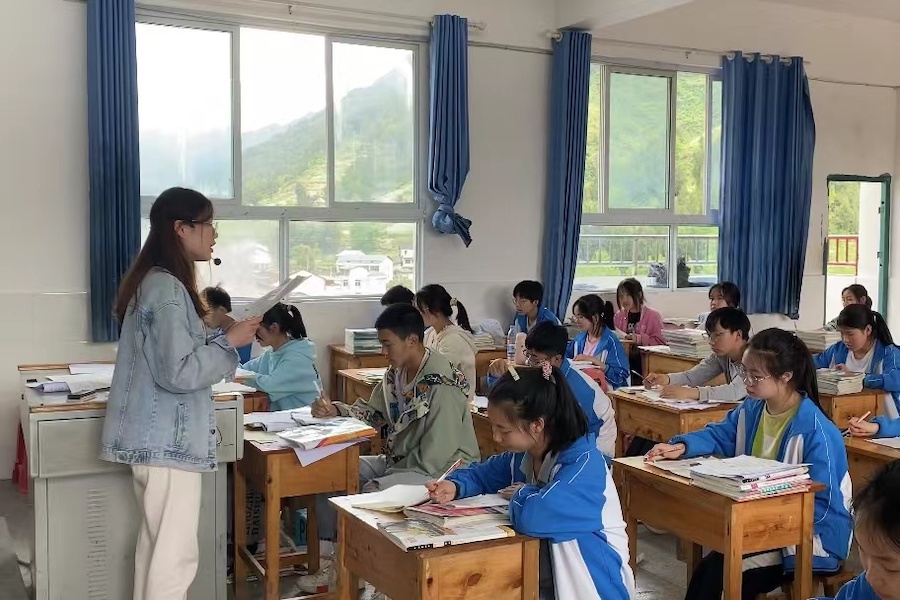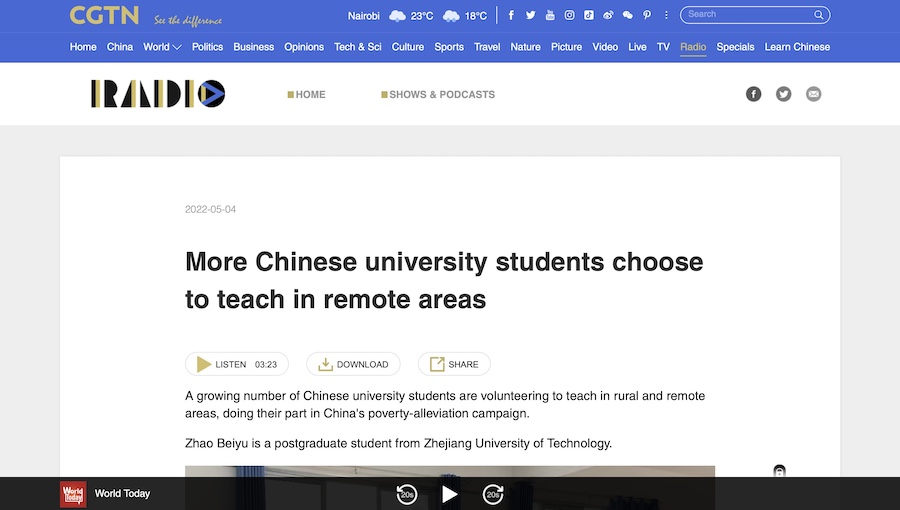5月4日,中國(guó)國(guó)際廣播電臺(tái)的英語(yǔ)資訊廣播(CGTN Radio)新聞縱貫線(The Beijing Hour)欄目播報(bào)我校研究生支教團(tuán)成員、化學(xué)工程學(xué)院趙貝瑜的西部支教事跡。
據(jù)報(bào)道,去年8月,趙貝瑜在四川省的一個(gè)偏遠(yuǎn)鄉(xiāng)村開始支教,在一年級(jí)的一個(gè)班任教數(shù)學(xué),在九年級(jí)的兩個(gè)班任教生物。趙貝瑜稱,初到四川時(shí),由于語(yǔ)言不通聽不懂當(dāng)?shù)胤窖裕瑹o(wú)法完全適應(yīng)支教生活,但一段時(shí)間之后,她也逐漸適應(yīng)了新的環(huán)境。這不是趙貝瑜在偏遠(yuǎn)地區(qū)的第一次支教,大二時(shí),她在貴州進(jìn)行了為期一個(gè)月的暑期支教。在貴州時(shí),趙貝瑜就下定決心將來(lái)要參加更多類似的支教活動(dòng),希望能夠?yàn)楦纳坡浜蟮貐^(qū)的教育水平盡自己的一份力量。
原文報(bào)道如下:
More Chinese university students choose to teach in remote areas
A growing number of Chinese university students are volunteering to teach in rural and remote areas, doing their part in China's poverty-alleviation campaign.
Zhao Beiyu is a postgraduate student from Zhejiang University of Technology.

Zhao Beiyu is teaching biology to ninth-grade students.
Last August, She participated in a campaign launched by her school and started teaching in a remote town in Sichuan Province. Since then she has been teaching math to a class in first grade and biology to two classes in ninth grade.
She says her journey did not start very well.
I remember last August when I first set out to Sichuan, it was raining heavily. The village I was assigned to is situated on a mountain. The road conditions were terrible. After we arrived there, I found that everyone was speaking Sichuan dialect which I didn't understand at all. The students there would answer my questions in their dialect, and I didn't know what they were talking about. I was feeling out of place back then.
However, after some time, she gradually adapted herself to the new environment.
After 9 months, I can now speak fluently in Sichuan dialect and the students will greet me warmly when they see me at the school. On my birthday they gave me many presents. Now I think this experience is priceless to me.
This is actually not the first time Zhao Beiyu has taught in a remote rural area.
In her sophomore year, Zhao spent a month during summer vacation teaching in Guizhou Province, one of the poorest regions in China.
Zhao says that she was stunned by what she learned.
During my stay there, I found that most of the kids there didn't know why they were going to school. When they grew up, most of them simply chose to make a living by helping their parents with the farm work. So it's not only about the scarce education resources. Their mindset also needs to change.
While in Guizhou, she made up her mind to spend more time volunteering in poverty-stricken communities.
After that month, I decided to join in similar campaigns in the future, and teach for a longer time. I hope that I could at least do my part in improving education in backward regions. I think this would be one of the most meaningful experiences in my whole lifetime.
An increasing number of university students in China now opt to teach in remote and rural areas where teachers are badly needed.
Yang Qing is a student majoring in education at Hainan Normal University. She has been teaching information technology to fifth graders in Xinjiang since a year ago.
I've dreamt of being a teacher since I was a child. So in my junior year, when I heard about this teaching campaign launched by my school, I immediately signed my name. The students here are passionate and adorable, and the people in Xinjiang are also very nice. Every time I teach a class and see my students listening carefully to me, I can feel I am needed and get a sense of value.
In 2003, the Communist Youth League of China and the Education Ministry co-launched a program to encourage Chinese university students to teach in remote and rural areas in Western China. So far more than 300,000 students have participated in this program.
Non-governmental organizations have also joined in by launching similar programs.

CGTN Radio報(bào)道
 校歷
校歷 郵箱
郵箱 EN
EN

 浙公網(wǎng)安備 33010302002621號(hào)
浙公網(wǎng)安備 33010302002621號(hào)